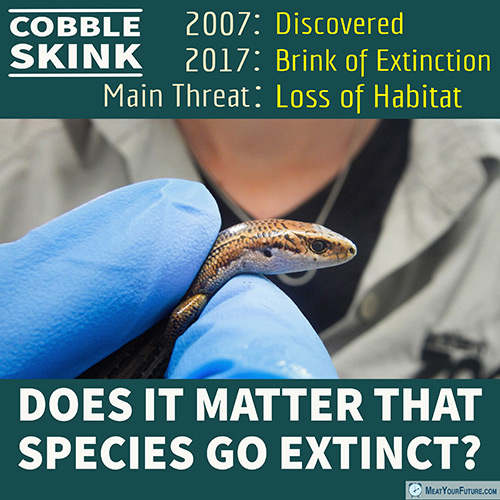
|
Cobble skinks were only just discovered in 2007, but they are now on the brink of extinction. Only a few remain inside a New Zealand zoo. The main threat that caused them to virtually go extinct: HABITAT LOSS. Similarly, an alarming number of other species are also rapidly being lost in what has now been classified as the Sixth Mass Extinction in earth’s evolutionary history. It’s worth noting the cobble skinks were only recently discovered. How many other species are going extinct before we even learn of them? How sad to lose millions of years of evolution in the blink of a geological eye. And, how irresponsible of humans to cause this. When it comes to habitat loss (which is largely responsible for this severe loss of biodiversity), according to the United Nations, it is the *livestock industry* that is both the largest user of land on the planet and the leading driver of deforestation. And, while natural habitats and other species are declining at alarming rates, our human population has tripled since 1950 from 2.5 billion to 7.5 billion people. With this rapid increase in our population has come a corresponding explosion in the demand for environmentally devastating animal foods, the mass production of which weighs immensely in driving every major environmental crisis we now face — including climate change, water pollution and water depletion, land use, deforestation, and species extinctions. So, population matters immensely. Curbing our population growth requires supporting education, family planning, and gender equality across the globe. In addition, abstaining from animal foods is also one of the most impactful positive actions you can take as an individual, both to help restore our environment, protect what’s left of the planet’s biodiversity, and (of course) to withdraw your support for the unnecessary exploitation and death inflicted upon countless billions of sentient animals used for food. Please consider the profound implications of your food and consumption choices, go vegan, and do whatever you can to help raise awareness of these issues. |